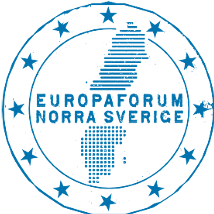European Forum of Northern Sweden’s comments on the Proposal for a Regulation of the European Parliament and of the Council amending Regulation (EU) 2019/631 setting CO2 emission performance standards for new passenger cars and for new light commercial vehicles
European Forum of Northern Sweden (EFNS) is a network for politicians at the local and regional levels from Norrbotten, Västerbotten, Jämtland Härjedalen and Västernorrland. EFNS is a meeting place and knowledge arena where EU policies are analysed and discussed in respects where it affects northern Sweden. EFNS monitors European issues to influence EU legislation, EU strategies and action programmes, and the EU budget. The purpose of EFNS is to safeguard the interests of northern Sweden both in the European arena and in relation to national level issues with a clear European perspective.
EFNS supports EU’s new and strengthened climate objectives and welcomes the Fit for 55 package of proposals. EFNS shares the European Commission’s assessment that a comprehensive electrification of the transport sector is of great importance for achieving set climate objectives.
However, EFNS has reservations about the proposed zero emissions requirement for passenger cars and light commercial vehicles. The European Commission’s proposal means that no new cars using biofuels such as HVO or biogas may be sold after 2035. This also excludes hybrid cars. Nor will it be possible to sell new cars powered by electric fuels.
The climate challenge is too vast to exclude bioenergy as a source of energy for passenger cars — the proposal is not technology neutral
Electric and hydrogen cars as such do not guarantee freedom from fossil fuels. Instead of requiring zero emissions at the tailpipe, the whole life cycle of the car and fuel solution must be assessed when assessing climate performance, in such a way that energy-intensive production stages – such as battery cell production – are included in the valuation process and green electricity production is promoted. Total electrification requires both new production of green electricity and a significant expansion of the electricity grid, which takes a long time to establish. Electric cars also need large amounts of metals and minerals. Mining is often associated with local resistance to mining and is hampered by long permit processes. Imports from countries with poor working conditions and lacking human rights are not a reasonable option. A rapid transformation of the transport sector requires all types of green energy, not just electrification. There is room for increased Swedish production and the use of biofuels based on residues from the forest industry. Biofuels and electrofuels should continue to be part of the solution towards achieving a fossil free transport system. The policy system should set requirements for climate performance – not point out a specific technology.
Swedish reduction obligation is based on increased blending of biofuels
The Swedish national fuel policy, through the reduction obligation, is still largely based on an increasing incorporation of various types of biofuels in petrol and diesel.
Achieving national targets requires further investments in the production of biofuels. The industry needs long-term and secure conditions in order for these investments to be able to take place.
Long distances and cold climate pose particular challenges for electrification — all solutions are needed!
Northern Sweden is sparsely populated (less than 12 inhabitants/km²) and the long distances pose particular challenges regarding the expansion of charging infrastructure, and thus the electrification of the car fleet. It is important that Northern Sweden, with its long distances and cold climate, has a well-functioning charging infrastructure plus access to various biofuel solutions because all solutions are needed if we are to meet our climate goals. Strict electrification requirements are not the solution, not for passenger cars, nor for other vehicles. Instead, we should match the right fuel solution to the particular transport need.
Adopted by the European Forum of Northern Sweden Forum on 5 October 2021
Glenn Nordlund (S) President EFNS, Region of Västernorrland
Åsa Ågren Wikström (M) Vice president EFNS, Region of Västerbotten
Jonny Lundin (C) Region of Västernorrland
Erik Lövgren (S) Association of municipalities, Region of Västernorrland
Rickard Carstedt (S) Region of Västerbotten
Ann Åström (S) Region of Västerbotten
Nils-Olov Lindfors (C) Region of Norrbotten
Britta Flinkfeldt (S) Municipalities of Norrbotten
Anders Josefsson (M) Municipalities of Norrbotten
Elise Ryder Wikén (M) Region of Jämtland Härjedalen
Robert Uitto (S) Region of Jämtland Härjedalen
Jonas Andersson (S) Municipalities of Jämtland County
Daniel Danielsson (C) Municipalities of Jämtland County
